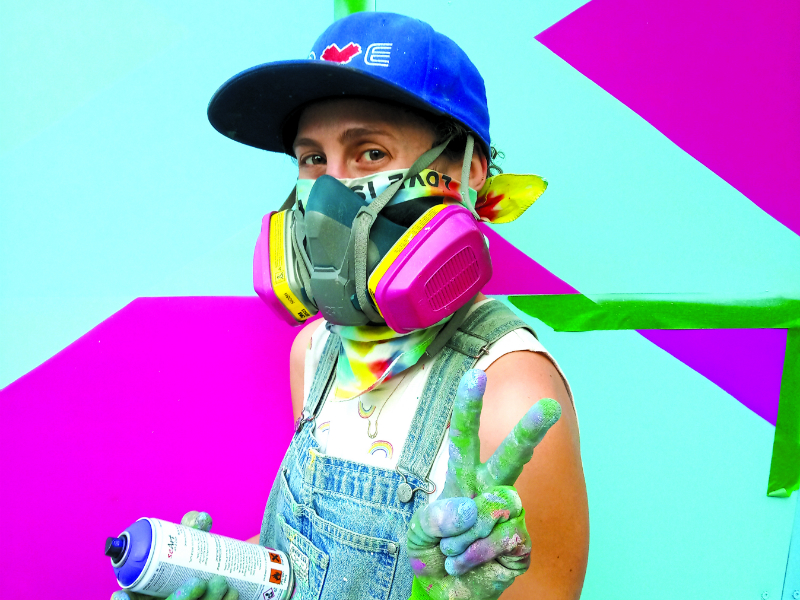A Toronto street artist known for text-based messages hidden in vivid, geometric designs has created a mural in Israel that uses no language at all. “There’s people from all over the world in Jerusalem, speaking so many different languages,” said Bareket Kezwer. “I felt that a symbol that could be understood by anyone, who speaks any language, would be more inclusive.”
Kezwer’s mural shows two hearts lying sideways, their points touching to form an infinity symbol. She created the entire 20-foot-by-8-foot painting, titled Infinite Love, in two long, hot days of painting on Nov. 4 and 5 at Jerusalem’s First Station, a cultural and event space.
Kezwer was invited to Jerusalem for the Jewish Street Art Festival, part of the fourth Jerusalem Biennale, an art exhibition held at a range of venues citywide. This year’s theme was “For Heaven’s Sake,” and the Jewish Street Art Festival included 18 installations and exhibits from diverse Jewish artists.
According to Biennale director Ram Ozeri, the event “does not seek to answer … what constitutes contemporary Jewish art; it endeavours to create a space where the discussion can take place and develop.”
Normally, Kezwer carefully plans exactly how each piece will look before she begins. In Jerusalem, though, she had to make decisions on the spot. “The location and the size of the piece didn’t come together until quite late,” she told The CJN. “Part of the process here was just going and seeing what the actual location looked like and visualizing the design.… I wanted to do this infinite heart, but I wasn’t sure what form it would take.”
She also couldn’t travel to Israel with a suitcase full of spray cans. “I don’t have any of my own paint supply here, so part of the decision was about seeing what was available.”
READ: LES CONTES D’HOFFMANN TO BE STAGED IN TORONTO
Kezwer was born in Israel but moved to Canada at the age of one. Working on her mural at the First Station, she was particularly moved that her father and stepmother, who have moved back to Israel, could come watch her work. Being a street artist, her work isn’t easily portable – and her massive pieces don’t always have the same impact in photographs.
Being in Israel and helping define Jerusalem’s landscape also meant a lot to her. “It’s just a really special experience being able to share my work within a community that has been part of my life since my birth,” she said.
Many of Kezwer’s murals can be seen around Toronto, especially one series that features the word “smile” hidden inside often blindingly colourful geometric designs. Since 2007, she’s created Smile murals and smaller street art in 13 countries.
“I love the idea of being able to engage with as many people as possible.… When it’s outdoors, that removes a lot of barriers that often prevent people from engaging with art.”
Kezwer has a bachelor’s degree in graphic design from York University and Sheridan College. Though she never worked as a graphic designer, a strong design sensibility permeates her art. “It’s that way of looking at the world through a grid … and through shape and form and colour,” she said.
She left her full-time job in 2015 to dedicate herself to art. Though she’s worked on commission for private individuals and major clients like The New Yorker, Facebook, Airbnb and many others, it’s clear that street art remains a major passion.
Kezwer said she believes in the power of street art to give voice to multiple perspectives. “I try to make space for different voices in the public realm, voices that are underrepresented.”
For the past three years, she’s led Womxn Paint, a collective of female and non-gender binary artists. Armed with aerosols and imagination, they’ve created 75 murals in Toronto alleyways and other overlooked urban spaces – always with permission from the spaces’ owners.
Kezwer also facilitates other groups of non-professional artists to give voice to their communities’ diversity. “The community has a chance not only to participate in developing the themes and framework … but actually participating in the creative production of the project,” she explained.
In 2017, she led an intergenerational mural project at Baycrest, bringing together residents, clients, patients and staff from all of Baycrest’s program areas, along with student volunteers. The mural, part of the City of Toronto’s Cultural Hotspot program, took six weeks to paint. It incorporates bright colours, Jewish themes and the word “community” in all eight languages spoken by the group.
That theme of community is also one Kezwer felt strongly about sharing with Jerusalem’s diverse residents and visitors around the busy First Station area.
“It’s a great location, it has a lot of other art and culture happening in the area. It feels like a nice fit,… facing a pedestrian and cyclist path, so you’re getting not only visitors to First Station, but also commuters and other people going about their daily lives, passing by.”
And even though there is no written message tucked into the piece, as there is with so much of Kezwer’s other art, the message is one that ultimately transcends language, as she explained: “Love is infinite, our capacity to love one another is infinite, and we each have a choice to engage in life from the point of view of love.”
